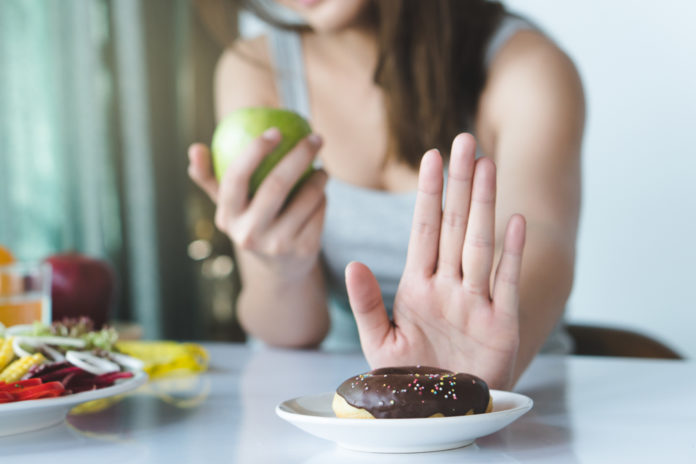The truth about sugar truly cannot be sugarcoated, as diets rich in the sweet stuff have been linked to obesity, heart disease, diabetes, and other chronic health conditions.
But first let’s get this settled: We are not exactly talking about the natural sugars coming from fresh fruits, veggies, and other nourishing whole foods, but rather the refined and added sugars often found in packaged and processed foods.
With the American Heart Association (AHA) estimating Americans eat an astonishing average of 80 grams per day, and their recommendation proposing males should consume no more than 38 grams of added sugar per day while women are limited to 25 grams, it truly is beneficial to cut down on the sweet stuff.
From experiencing changes in mood to knowing what to eat when craving sweets, here are some of the biggest problems when cutting out sugar and how to solve them!
8 Biggest Problems When Cutting Out Sugar
(& How to Solve Them)
Problem #1: Well, it might be difficult to cut out the sweet stuff…
One of the first things you might notice when cutting out sugar is just how embedded within the food supply it is, thus making its removal a little bit more difficult than simply skipping out on the dessert menu.
Sugar is quite embedded into the Westernized food supply and is even added to a wide variety of foods you thought were healthier options, including yogurt, cereal, granola bars, sauces, and dressings.
How to Solve It:
One of the simplest ways to avoid added sugars is by skipping out on packaged goods and resorting to more nourishing foods, including whole grains, fruits and veggies, lean and plant-based proteins, and healthy fat sources. Sticking to the store’s perimeter where these sort of nutritious sources tend to reside is a simple solution to lessen temptation of sugary goods within the weaving aisles.
While doing completely away with all boxed products is unnecessary, you should still be cautious of the risks of added sugars. Taking advantage of the Nutrition Facts and Ingredient labels and limit or avoid purchasing products is a way to do so.
Problem #2: Craving sweets is likely, if not inevitable.
With sugar so deeply embedded into the food supply and displaying addictive properties, there really is no surprise cravings towards it continue to intensify. That being said, craving sweets is likely, if not inevitable, when cutting out sugar.
How to Solve It:
Wondering what to eat when craving sweets? Here are the best foods to beat food and sugar cravings, including naturally-sweetened fruits, healthy fat sources such as fatty fish and avocado, herbal teas, and water.
From keeping a food journal to staying active, these 15 simple tips can also help break a sugar addiction.
Problem #3: Energy levels might plummet.
That so-called “sugar rush” was not pulled out of thin air…
Especially if relying on sugar to give you that extra midmorning or afternoon boost, you might encounter plummeting energy when giving up those sweet treats, soda, and other sugary snacks and energy drinks.
How to Solve It:
Rather than relying on sugar for an instant energy boost, eat these energy-boosting foods (and can even be prepared when in a hurry)!
And while coffee is a common and often harmless way to kick of the day, consider implementing these simple ways to wake up without relying on caffeine and sugar.
Problem #4: Mood changes are common.
Especially if quitting sugar cold turkey, you might experience a flip on your mood, including anger, anxiety, irritability, and agitation.
How to Solve It:
Get a grip on emotions by practicing and implementing stress-relieving techniques, including exercising, meditating, reading, and calling a friend. Eventually your mood should bounce back and stabilize so hang in there!
Problem #5: Sleep may be altered.
Changes in energy and mood can hinder a good night’s rest. While not all experience sleep alterations, some report difficulties getting to sleep while others encounter full-blown insomnia.
How to Solve It:
Getting a handle on sleep is imperative for managing a sugar addiction, as craving the sweet stuff is often escalated when deprived of those Zzz’s.
Gain a better night’s rest by creating healthy bedtime routine, including staying consistent with bedtimes, powering down from electronics leading up to bedtime, evaluating your sleep environment, and practicing relaxation techniques.
Problem #6: You might face digestive issues.
Quitting sugar can significantly improve your digestion, though you may experience some discomfort in the beginning.
Especially if eating more fruits when craving sweets, your fiber load may be strikingly more than usual, thus causing gastrointestinal distress. And not to mention, the discomfort artificial sweeteners can trigger if going for those “sugar-free” products.
How to Solve It:
Along with allowing your gut to adapt to the sugarless conditions, also try to detect if there is an underlying culprit.
If an increase in fiber is the cause, be sure to likewise increase fluid intake to prevent against constipation. And if you are consuming sugar-free products, try to reconsider their intake or at least minimize their consumption.
Problem #7: Flu-like symptoms could emerge.
While cutting out and limiting sugar does the body good, some people might experience flu-like symptoms initially, including fatigue, loss of appetite, headaches and shakiness.
How to Solve It:
While managing a sugar detox is different from fighting a flu, there are similarities in the path of feeling better. Allow yourself the rest you need, along with nourishing the body with wholesome foods. Keep hydrated with water and fight
Problem #8: You may encounter some mixed reactions.
Whereas cutting out sugar is admirable, you might encounter some mixed reactions if going public or announcing its removal. And while most are supportive of such a decision, and may even follow your healthful lead, others might question your tactics and choices.
How to Solve It:
If you find yourself encountering negative messages, the best strategy is simply staying true to yourself and say. Remember, this is your decision and whatever challenge you try to tackle, it is likely out of good intentions and for good health!








